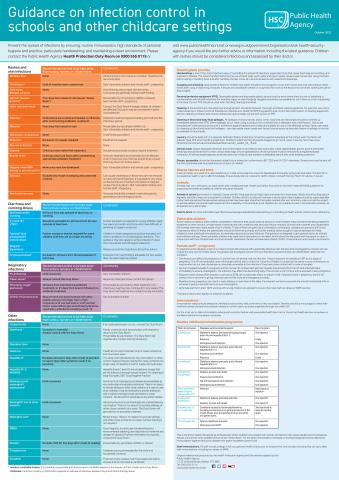Why Infection Prevention is Important in Schools

Infections can spread quickly in schools, affecting not only students but also teachers and staff members. When students are absent from school due to illness, it can impact their academic performance, social interactions, and overall well-being. Furthermore, infections can lead to more severe health issues, such as pneumonia, meningitis, and other life-threatening conditions. Infections can also affect the entire school community, causing widespread absenteeism, disrupting learning, and placing a significant burden on the healthcare system.
Common Infections in Schools
Some of the most common infections in schools include:
- Influenza: Also known as the flu, influenza is a highly contagious respiratory illness that can spread quickly in schools.
- Norovirus: A highly contagious gastrointestinal illness that can cause vomiting, diarrhea, and stomach cramps.
- Respiratory Syncytial Virus (RSV): A common virus that affects the respiratory system, causing symptoms such as coughing, sneezing, and runny nose.
- Strep Throat: A bacterial infection that causes sore throat, fever, and swollen lymph nodes.
- Conjunctivitis: Also known as pink eye, conjunctivitis is a highly contagious eye infection that can spread quickly in schools.
Ways to Prevent Infections in Schools
Preventing infections in schools requires a multi-faceted approach that involves students, teachers, parents, and the school administration. Here are some ways to prevent infections in schools:
- Practice Good Hygiene: Encourage students and staff members to wash their hands frequently with soap and water, especially after using the bathroom, before eating, and after blowing their nose, coughing or sneezing.
- Cover Your Mouth and Nose: Teach students to cover their mouth and nose with a tissue or their elbow when coughing or sneezing to prevent the spread of respiratory droplets.
- Clean and Disinfect: Regularly clean and disinfect high-touch surfaces, such as doorknobs, light switches, and countertops, to prevent the spread of germs.
- Stay Home When Sick: Encourage students and staff members to stay home when they are sick to prevent the spread of infections.
- Get Vaccinated: Encourage students and staff members to get vaccinated against influenza and other vaccine-preventable diseases.
- Use Personal Protective Equipment (PPE): Provide PPE, such as masks, gloves, and gowns, to students and staff members who need to care for someone who is sick.
- Improve Ventilation: Improve ventilation in schools by opening windows, using fans, and upgrading heating, ventilation, and air conditioning (HVAC) systems to reduce the concentration of airborne pathogens.
Role of Students, Teachers, and Parents in Infection Prevention
Students, teachers, and parents all play a crucial role in maintaining a healthy school environment. Here are some ways each group can contribute:
- Students:
- Practice good hygiene
- Cover their mouth and nose when coughing or sneezing
- Stay home when sick
- Get vaccinated
- Report any symptoms or concerns to their teachers or school nurse
- Teachers:
- Encourage good hygiene practices
- Model healthy behaviors
- Stay home when sick
- Report any symptoms or concerns to the school administration
- Clean and disinfect high-touch surfaces regularly
- Parents:
- Encourage good hygiene practices at home
- Ensure their child gets vaccinated
- Keep their child home when sick
- Report any symptoms or concerns to the school administration
- Volunteer to help with infection prevention efforts in the school
Frequently Asked Questions (FAQs)
- Q: What is the most effective way to prevent infections in schools?
A: Practicing good hygiene, such as washing hands frequently with soap and water, is the most effective way to prevent infections in schools. - Q: How can I prevent the spread of influenza in my school?
A: Encourage students and staff members to get vaccinated, practice good hygiene, and stay home when sick to prevent the spread of influenza. - Q: What should I do if I have a weakened immune system and am at risk of getting sick?
A: If you have a weakened immune system, take extra precautions to prevent infections, such as avoiding close contact with people who are sick, practicing good hygiene, and getting vaccinated. - Q: How can I clean and disinfect high-touch surfaces effectively?
A: Use a disinfectant that is effective against a broad range of pathogens, such as EPA-registered disinfectants, and follow the manufacturer’s instructions for use. - Q: What is the role of the school administration in infection prevention?
A: The school administration plays a crucial role in infection prevention by developing and implementing infection prevention policies, providing resources and support for infection prevention efforts, and communicating with students, teachers, and parents about infection prevention.
Conclusion
Infection prevention in schools is a critical aspect of maintaining a healthy learning environment. By practicing good hygiene, staying home when sick, getting vaccinated, and using personal protective equipment, students, teachers, and parents can all contribute to preventing the spread of infections. The school administration also plays a vital role in developing and implementing infection prevention policies and providing resources and support for infection prevention efforts. By working together, we can create a healthier and safer school environment for everyone. Remember, infection prevention is a shared responsibility, and every individual can make a difference in preventing the spread of infections in schools. By taking the necessary precautions and following the guidelines outlined in this article, we can reduce the risk of infections and create a healthier and more productive learning environment for all.
Closure
Thus, we hope this article has provided valuable insights into Infection prevention in schools. We appreciate your attention to our article. See you in our next article!